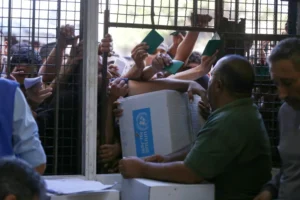It is time for Israel to be removed from the United Nations

UNRWA distributes aid parcels to Palestinians at a school building in Deir al-Balah, Gaza on 7 November 2024
Samer Jaber writes in Al Jazeera on 14 November 2024:
There is a growing civil society movement in Palestine and around the world demanding Israel’s expulsion from the United Nations or suspension from its current session over its apartheid regime in the occupied Palestinian territory, ongoing war crimes in Gaza and other persistent violations of the UN Charter.
This demand is in line with the goals and ambitions of the global Boycott, Divestment, Sanctions (BDS) movement. For months, however, there have been discussions within the movement over the pros and cons of calling for the revocation of Israel’s membership with hesitation primarily stemming from concerns over potential Israeli retaliation. Some feared Israel might respond by blocking UN agencies from providing essential services to Palestinians, particularly in Gaza, where such aid is critically needed. However, recent laws passed by the Israeli Knesset that ban UNRWA, the UN agency for Palestinian refugees, from operating in territory under Israeli control have removed this pragmatic restraint. By crossing this red line, Israel has undermined the main reason for those committed to Palestinian liberation not to call for its expulsion from the UN, paving the way for the powerful slogan “expulsion for expulsion”.
So why did Israel ban UNRWA from operating in territory it occupies?
As Naser Sharaya’a, the spokesperson for the Popular Services Committees in the occupied West Bank’s refugee camps, spelled out in a recent statement: “Israel’s ban on UNRWA is part of a broader strategy aimed at undermining the right of return for Palestinians who were uprooted from their homeland in the 1948 Nakba, when the state of Israel was established.”
More than 700,000 Palestinians were forcefully displaced leading up to Israel’s creation in 1948, which Palestinians remember as the Nakba, or “the catastrophe”. Soon after the Nakba, the UN General Assembly adopted Resolution 194, which affirmed the rights of these Palestinian refugees – and their descendants – to the homes they were forced to leave. A year later, UNRWA was created on the back of this resolution and was tasked with providing essential services to Palestinian refugees, such as education and primary healthcare, as they awaited their return.
